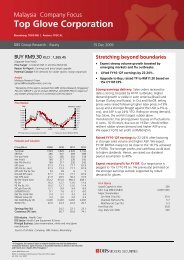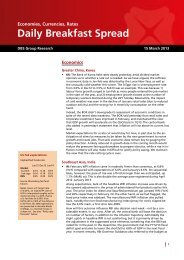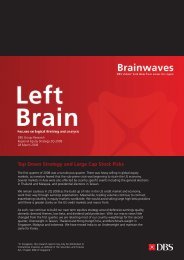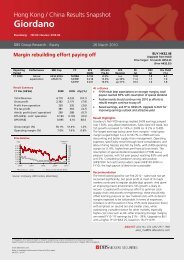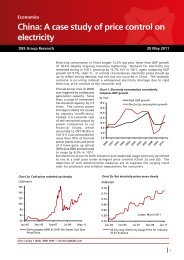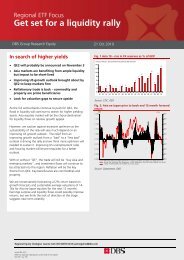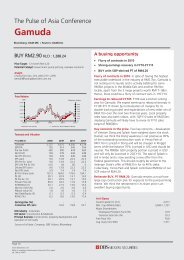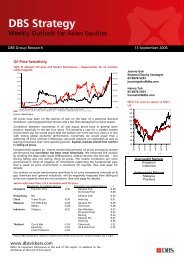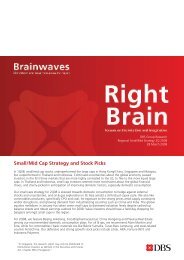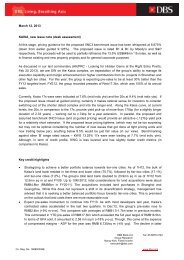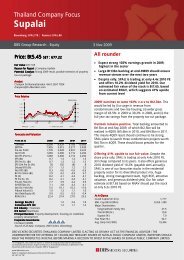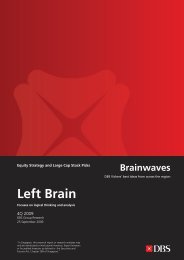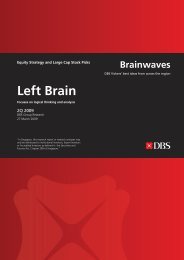Economics Markets Strategy - the DBS Vickers Securities Equities ...
Economics Markets Strategy - the DBS Vickers Securities Equities ...
Economics Markets Strategy - the DBS Vickers Securities Equities ...
Create successful ePaper yourself
Turn your PDF publications into a flip-book with our unique Google optimized e-Paper software.
<strong>Economics</strong>: China<br />
<strong>Economics</strong> – <strong>Markets</strong> – <strong>Strategy</strong><br />
CN: Re-thinking CNY<br />
appreciation<br />
• Evidence since Jul 21, 2005 suggests appreciation of <strong>the</strong> CNY has nei<strong>the</strong>r<br />
curbed <strong>the</strong> trade surplus nor tamed inflation. On <strong>the</strong> contrary, it has<br />
complicated <strong>the</strong> management of monetary policy. Appreciation has not<br />
only invited more hot capital inflows, but encouraged <strong>the</strong> growth of foreign<br />
currency loans<br />
• It is difficult to control lending without raising <strong>the</strong> cost of capital amidst<br />
an inflationary environment. Higher reserve requirement ratios and <strong>the</strong><br />
imposition of a credit quota have not controlled loan growth<br />
• In light of our upward revision on Fed funds rate and a 6.5% 2008 inflation<br />
forecast for China, we now expect benchmark lending rate hikes (of 27bps<br />
each) in 4Q08, 1Q09 and 2Q09. Should this happen, <strong>the</strong> pace of CNY<br />
appreciation must be slowed down sufficiently to around 3%-4% in 2009<br />
to reverse <strong>the</strong> ‘appreciation expectation factor’<br />
• While this may be unappealing to <strong>the</strong> market now, <strong>the</strong> risk of not changing<br />
<strong>the</strong> policy mix soon would inevitably lead to more aggressive rate hikes in<br />
<strong>the</strong> future<br />
CHINA<br />
Exports to <strong>the</strong> US<br />
and EU have been<br />
declining<br />
Negative income shock hurts exports more than a streng<strong>the</strong>ning CNY<br />
There is little evidence to suggest that <strong>the</strong> narrowing in China’s trade surplus so<br />
far this year is attributable <strong>the</strong> appreciation of <strong>the</strong> CNY. While a strong currency<br />
– on top of rising material and labor costs – have probably hurt exporters, most<br />
of <strong>the</strong> pain has probably come from <strong>the</strong> global slowdown.<br />
Exports to <strong>the</strong> US and EU<br />
have been declining (Chart<br />
Chart 1: China exports by destination<br />
1). The Asian financial crisis % YoY, 3mma<br />
70<br />
in 1998 and <strong>the</strong> bursting<br />
Asia EU USA<br />
of <strong>the</strong> ‘tech bubble’ in 2000/<br />
01 demonstrated that China’s<br />
exports suffer when its<br />
60<br />
50<br />
trading partners experience<br />
economic downturns. For 40<br />
instance, China’s export<br />
growth dropped to 0.5% 30<br />
in 1998 and 7.0% in 2001<br />
from 21.0% in 1997 and<br />
28.0% in 2000 – suggesting<br />
that a ‘negative income<br />
20<br />
10<br />
shock’ could be an effective 0<br />
tool to curb China’s trade Apr-00<br />
surplus.<br />
Apr-02 Apr-04 Apr-06 Apr-08<br />
Chris Leung • (852) 3668 5694 • chrisleung@dbs.com<br />
70



